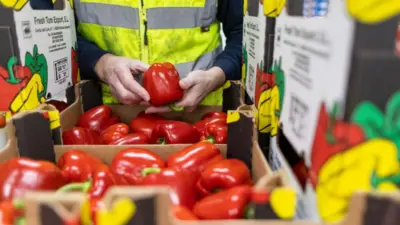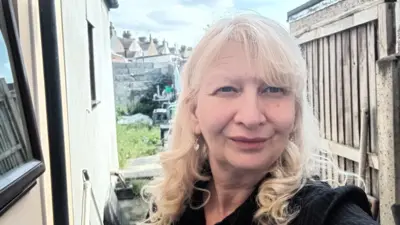We've updated our Privacy and Cookies Policy
We've made some important changes to our Privacy and Cookies Policy and we want you to know what this means for you and your data.
Manningtree: The tiny town that dreams of saving the planet
- By Charlie Jones
- BBC News, East
Image source, TazzyBro Photography
The riverside town of Manningtree in Essex may be small, but when it comes to the environment, it's making big waves.
The tiny place on the River Stour has been given special environmental status after its businesses agreed to stop using unnecessary single-use plastics.
Mother-of-two Bekki Bibko was the driving force behind that change. Three years ago she formed a community group with other residents who were growing increasingly concerned about the climate crisis.
"I believe we are stewards of this planet and we have a responsibility to leave something behind that is not damaged," she says.
The group called PACE, which stands for Practical Actions for Climate and the Environment, organises litter picks with reusable sacks and has planted 300 trees in a community orchard.
Bekki also persuaded most of the businesses in Manningtree to ban single-use plastics. The town was awarded plastic-free status by the campaign group Surfers Against Sewage (SAS) as a result.
"It has been a great way to engage the people living here. We hope they will start thinking about bigger changes like driving less, flying less, eating locally grown food, reducing their waste and maybe getting solar panels," she says.
And Bekki isn't finished yet. She wants to get more of the takeaways in Manningtree on board and is also talking to businesses in the neighbouring villages of Mistley and Lawford about reducing their plastic use.
"Manningtree has made so many great changes. We just need to get more people involved and we can achieve even more," she says.
Image source, TazzyBro Photography/Essex Life
Manningtree's mayor Michelle Taylor agrees. The wedding celebrant says she couldn't be more proud of the tiny town, which is the smallest in England when it comes to geographical size, at just 19 hectares (47 acres).
"We might be small but we're really putting ourselves on the map for being a green town that's just a lovely place to live in and visit," she says.
Michelle is currently planning the town's Jubilee celebrations, which will utilise recycled products, and has just funded a toy library at the beach using donated buckets and spades.
Down at the beach, a group of wild swimmers called the Manningtree Mermaids take to the water every day at high tide.
They are growing increasingly angry about water quality and organised a protest last year after Anglian Water admitted there were 187 sewage spills into the river in 2020, while The Rivers Trust counted more than 1,000 hours of raw sewage being discharged there.
Image source, Alexander Ward
The Mermaids are holding another protest on Manningtree beach on 23 April, in connection with a national day of action by SAS.
Mother-of-three and small business owner Anna Helm Baxter, who swims with the group daily, says the water quality isn't just a health issue for swimmers, but also for wildlife, plants, insects, and fish.
"I love being surrounded by a community that cares about our ecosystem. That sort of thing has a ripple effect, it instantly makes you think 'Oh! I should be doing more too!' and that is exactly how individual actions create big impacts. "Whilst I'm focusing my energies on the water for now, I'd love to see more people cycling and walking instead of driving, reducing their personal consumption of things and composting household food waste," Anna adds.
Just behind the river, on the high street, The Wholefood Store sells loose, unpackaged organic fruit and veg, natural supplements, refillable laundry, kitchen and body products plus dried foods in dispensers.
Sarah Mawkes opened the store in 1998 when people were less conscious of climate change, she says.
"We were doing refills for households right from the beginning, so in that respect some people were conscious of the environment but there wasn't such a movement."
One of her customers has been refilling the same washing up bottle for 22 years, which she describes as "incredible". She hopes more people and businesses in the town will start putting the environment first.
"It really is a slow learning process," she says. "It's a whole way of life."
Image source, Lucy Toms photography
Customers could have their produce delivered by bike soon. Manningtree resident Leon Pearson has been talking to the shop, while in the process of raising money to buy a cargo bike for the community to use.
The bike will be available for people and businesses to rent out at a low cost. Leon has been awarded a £5000 grant from Essex County Council, which is funding projects tackling climate change in the county.
"A big part of it cutting down emissions, reducing local air pollution and congestion, and encouraging active travel to improve health," he says.
A few doors down from the Wholefood Store, Sherri Singleton runs the renowned Italian restaurant Lucca and its sister seafood restaurant, The Mistley Thorn, in the neighbouring village of Mistley.
Sherri says they try to re-use everything they can from flour sacks that double up as bags to deliver freshly baked bread to shower caps, which they put over the dough to help it rise.
Image source, Mark Bolton
"The shampoos in the bedrooms in the hotel are all [in] large refillable containers; we compost all of our food; our oil is used for bio fuel; our quality house wine comes in a box and our produce is delivered by crate from local veg companies and the butcher," she says.
Sherri believes working in this way is good for business as well as the environment, because waste removal is so expensive.
"I've been saying to my team for years 'let's slim the bins' and think about everything that goes into them," she adds.
Just off the high street lies South Street, which rises to offer a view of the river. At the bottom of the hill is the office for the online platform RentMy, which allows users to rent out anything they own.
Tom West, who is also the landlord of the Red Lion pub at the top of the hill, came up with the idea in 2006 while on holiday in France when he couldn't find a kayak to rent.
A year ago, he decided to put his plan into action in Manningtree, where he employs six members of staff. He hopes to expand the platform across the whole of the UK in the next few months.
Tom, who is planting a tree each time someone signs up to RentMy, says: "We've got to stop this consumption where things come out of the ground and we just use them for a few years and throw them away.
"We're going to run out of resources unless we turn to rentals and the sharing of items. It prevents the shipping, retailing and manufacturing for things that might only be used once or twice."
Having grown up in Manningtree, he believes the town benefits from being so confined by the river and the hill.
"It's such a compact space and that makes it wonderful, it builds our community. We are all focussed on the same thing. We are lucky to live by the river and we really don't want to pollute it," he adds.
On the same street, former music industry executive Steve Tattam runs the vinyl and wine shop Winyl, which he opened in 2018.
Steve sells organic wine and craft beer that can be taken away or consumed in the shop, which doubles up as a bar. A selection of new and second-hand vinyl is for sale, and visitors can enjoy a drink while playing records on the store's decks.
Every decision Steve makes comes from being ecologically conscious, he says, from choosing sustainably sourced energy to using reclaimed wood, making sure all of the drinks are vegan and even stocking carbon neutral wine.
"From the start we decided we wanted to do business in a nice way that doesn't harm the environment," he says.
Image source, Daniel Jones
The packaging he uses can all be recycled, from bags made from sugar cane to coasters that can be pulped to biodegradable paper covers on the vinyl.
"All the decisions we make are to help in our own little way. We're only a small business but every little does help," he adds.
Steve is helping organise Manningtree Earth festival, which will take place on 26 June and aims to help local people learn how to live a sustainable lifestyle.
Fellow PACE member Bonny Williams, who is also organising the festival, believes Manningtree can be a beacon of hope for other towns but more needs to be done to try and engage residents who are less environmentally aware.
"We don't have the luxury of preaching to the converted anymore. We need to reach the people who are disengaged. We need to educate them, give them some inspiration and hope and also some practical and positive ways they can make changes," she says.
Back at the beach, Sharon Barker is tending to an area of plants with her fellow Manningtree Street Keepers.
Every Monday the group of volunteers, aged from six to 87, can be found clearing litter around the town while hand weeding and planting flowers chosen to help wildlife.
They recently picked up 669 cigarette butts during a litter pick on the high street.
"I started the group because I'm really, really worried the world is going to hell in a handcart, ecologically," says Sharon, who sits on Manningtree Town Council.
The council voted to suspend its twice-yearly spraying of glyphosate amid growing concerns about its impact on health and the environment, and is relying on the volunteers instead. It has also removed all single-use plastic from its premises and operations.
"We're trying to spread the message that anyone with a garden can grow something that will help insects, and that will then support wildlife higher up the food chain such as birds, including our local swift population.
"We can all do our little bit and eventually it all adds up to make a big difference," she says, before returning to the soil to plant some more seeds.
Find BBC News: East of England on Facebook, Instagram and Twitter. If you have a story suggestion email eastofenglandnews@bbc.co.uk
Top Stories
Features & Analysis
Most read
Content is not available








